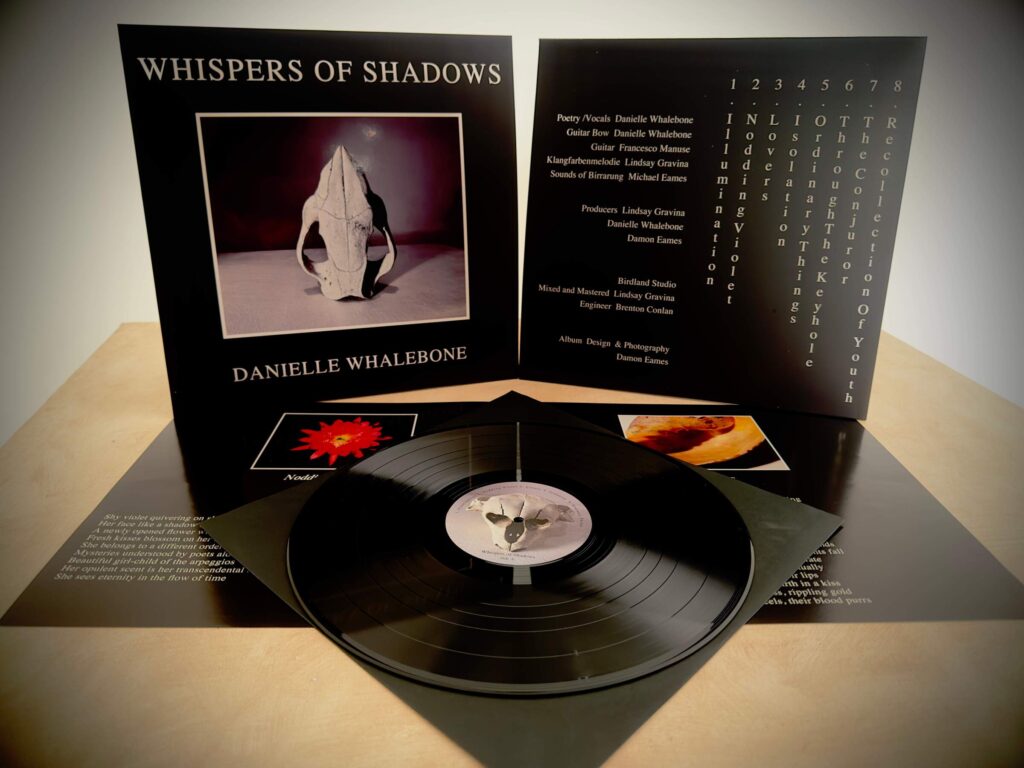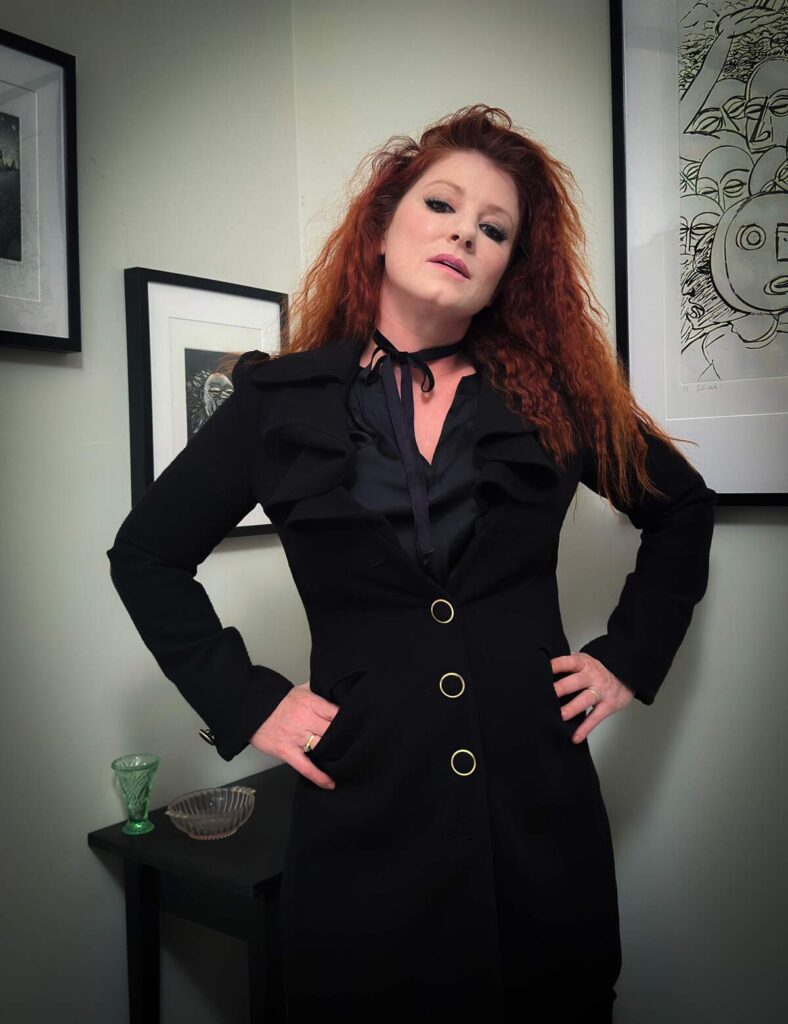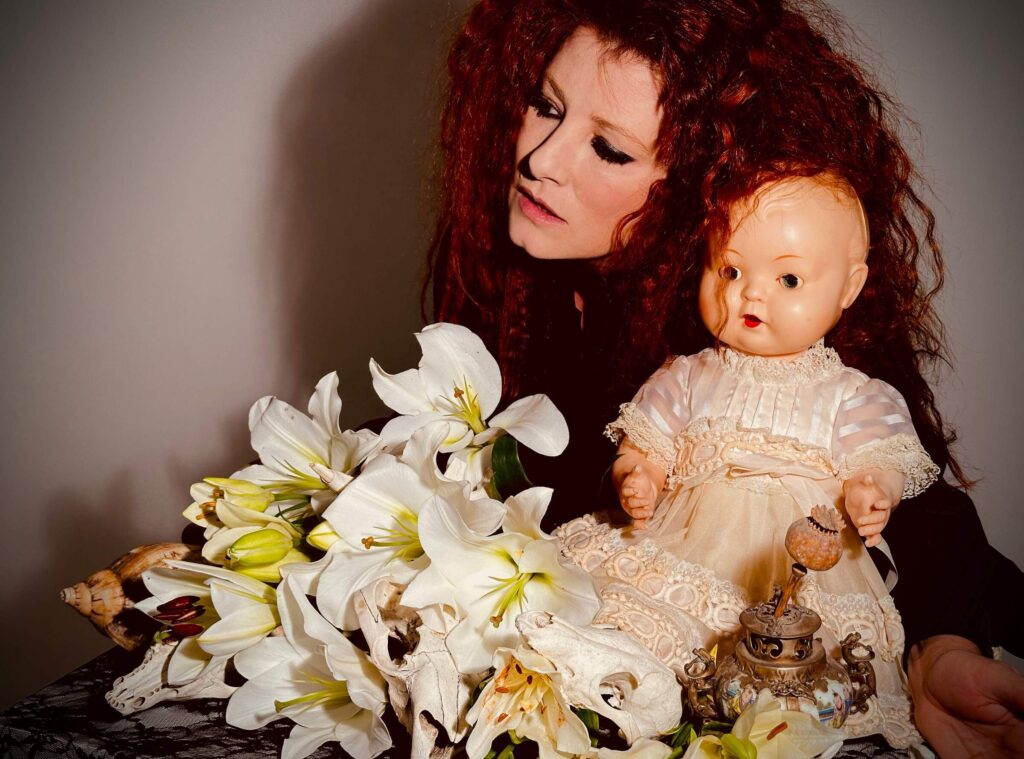Danielle Whalebone | Interview | New Album, ‘Whispers of Shadows’
‘Whispers of Shadows’ is the latest album by Australian singer-songwriter Danielle Whalebone, offering a sonic and poetic exploration of human emotions through noise guitar and poetic verses.
The album, produced by renowned music industry figure Lindsay Gravina, showcases an innovative use of klangfarbenmelodie and marks a pivotal evolution in Whalebone’s career. Accompanied by guitarist Francesco Manuse, Whalebone released a limited edition vinyl, featuring an eight-page booklet of poetry and photography. This album delves into the emotional landscapes of isolation, connection, and resilience, featuring a unique blend of noise guitar and poetic lyrics.

“Balancing the chaos and harmony in a state of complete thoughtlessness”
‘Whispers of Shadows’ delves deeply into themes of isolation and human connection. Can you elaborate on the initial inspiration for this album and how these themes emerged and evolved during its creation?
Danielle Whalebone: ‘Whispers of Shadows’ was initially inspired by a period of introspection during the lockdowns in Melbourne. The creation process began with an impromptu recording of Francesco and me improvising at Birdland Studios. During lockdown, I recorded my poetry over the guitars, creating the structure. After the lockdowns ended, I returned to Birdland Studios with a collection of samples that were then woven into the music to further enhance the sonic soundscape. It evolved into an album that had a distinct beginning, middle, and end.
Your poetry plays a crucial role in the album, mirroring collective human experiences. How do you approach integrating your poetic verses with the sonic elements of your music? Do the lyrics inspire the music or vice versa?
I had been listening to the recording of the guitars for some time before it became clear to me that this was my next project. Once I knew what I wanted to achieve, I found pieces of poetry in my collection that suited the emotional soundscape. I then set about matching the nuances in the music to the spoken word.
The single ‘Ordinary Things’ features the use of klangfarbenmelodie, which adds a unique texture. What drew you to this technique, and how do you feel it enhances the narrative and emotional depth of the track?
The raw emotion of the track ‘Ordinary Things’ required a dramatic shift in the soundscape. The use of the technique wakes the dreamer from their sleep into a stark reality, marking the halfway point in the album. The technique regained popularity in Berlin in the 1980s and has been used by musicians that I am inspired by, such as Björk.
Your distinctive use of noise guitar creates an immersive auditory experience. Can you describe your creative process in developing these experimental soundscapes? How do you balance chaos and harmony in your compositions?
I initially began using a bow on my guitar to create unique sounds to enhance the songs that I had been writing. I then began experimenting further by interweaving the bow sounds with the lead guitar to create sonic soundscapes. Francesco uses alternative tuning, enhancing the uniqueness of the sounds that we create. Through improvising together over a period of time, we began to seamlessly weave the sounds of the instruments, balancing the chaos and harmony in a state of complete thoughtlessness.
Lindsay Gravina’s production is renowned for its complexity and sophistication. How did his involvement shape the sound and feel of ‘Whispers of Shadows’? Can you share any specific moments during production that were particularly transformative?
This album evolved very differently from anything that I had worked on at Birdland in the past. Due to the nature of the project, it allowed everyone involved the freedom to collaborate without restraint. Lindsay’s contribution ultimately shaped and transformed the album into a sonic work of art.
Much of the album was recorded in your home studio during the lockdown. How did the intimate and isolated setting influence the music and lyrical content?
The time spent in lockdown gave me an opportunity to reflect and write. I was able to experiment and had no expectations. I just wrote and allowed the album to take shape without any preconceived ideas.
The journey of the album began and concluded at Birdland Studios. What is the significance of this studio to your creative process, and how did the sessions there differ from your home recordings?
Birdland Studios is a place that inspires creativity and frees me from the mundanity of life. When I am there, I am focused entirely on the music and the creative process. I completed the spoken word recordings at home in as few takes as possible to ensure that it maintained the spontaneity that is often captured in a studio setting.
Featured guitarist Francesco Manuse will accompany you on tour. How did his collaboration impact the album’s sound? What unique elements did he bring to the table?
The impromptu recording of Francesco and me improvising at Birdland Studios was a transformative experience. It felt like we left the physical realm. I knew that we had captured something truly beautiful. I didn’t know if we would be able to create another moment like that again, but we have continued to experience a waking dream when we play.
Each track on ‘Whispers of Shadows’ is described as a window into an introspective world. Can you share more about the narrative arc of the album?
The narrative begins before lockdown in a place of disillusionment, observing the superficial and destructive nature of humans. It then draws you into the natural world where innocence and beauty are cherished. Desire is the next theme, followed by loneliness and a descent into insanity. The album reaches its peak with a cry for serenity. The next themes are of acceptance, apathy, and finally of wisdom and freedom.

“‘Whispers of Shadows’ was born out of necessity.”
Reflecting on your previous albums ‘Milk Teeth’ and ‘Tonic Clonic,’ how has your music evolved leading up to ‘Whispers of Shadows’? Are there particular influences or experiences that have significantly shaped this new work?
‘Whispers of Shadows’ has sonic elements that have been carried through from my previous albums, but it is a shift away from conventional songwriting. The experience of being in lockdown significantly shaped the new album. Playing music with a band had ceased entirely. ‘Whispers of Shadows’ was born out of necessity.
You formed Animal Hands in 2011. Can you share what initially inspired you to start the band and how you developed your distinct sound?
I was inspired to start a band after attending the 2009 All Tomorrow’s Parties curated by Nick Cave. Upon the mountaintop, I crossed paths with Nick. I gave him a black feather, which he put in the lapel of his jacket. Nick then signed my copy of King Ink in black eyeliner, and I became a devotee of rock and roll forever more.
What else occupies your life?
I am currently in the concept and development phase of working on a live show for ‘Whispers of Shadows.’ I spend most of my free time seeing live music performances, listening to my vinyl collection, and reading and writing poetry.
Would love it if you could discuss some of the early influences and how that led you to write ‘Whispers of Shadows.’
There are several artists that influenced the album. They are Dirty Three, as their music is emotive and often features melancholic soundscapes; Sonic Youth, as they use unconventional guitar tunings, have extended instrumental sections, and blend punk rock with avant-garde experimentation; and Patti Smith and Kevin Shields, as they created an artistic, poetic exploration, merging spoken word with atmospheric noise guitar. Also, Rowland S. Howard is revered for his artistic integrity, emotional depth, and pioneering contributions to post-punk and alternative rock, and Björk, as her work continually pushes boundaries sonically.
Let’s end this interview with some of your favourite albums. Have you found something new lately you would like to recommend to our readers?
Trying to choose favourites is beyond my capacity. Some new albums that I would recommend are ‘Love Changes Everything’ by Dirty Three and ‘Wild God’ by Nick Cave and the Bad Seeds.

Thank you for taking your time. Last word is yours.
Love is all you need.
Klemen Breznikar
Danielle Whalebone Facebook / Instagram / Bandcamp / YouTube




